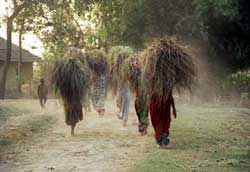 For many years the area around the Royal Bardia National Park has been a hotbed of political dissent. This is hardly surprising when you consider that some 5,000 people had to be moved out of the Babai valley to extend the park area in the 1970s.
For many years the area around the Royal Bardia National Park has been a hotbed of political dissent. This is hardly surprising when you consider that some 5,000 people had to be moved out of the Babai valley to extend the park area in the 1970s. Many of these people received no compensation. They had probably been living in the area for some time, but had no title deeds to the land. No deed, no compensation. Evicted, most have since been again squatting on land for which they have no titles.
Much data was collected in the area in the late 1990s under the the UNDP-supported Parks and People project, now renamed Participatory Conservation Programme, run by the Department of Wildlife Conservation and National Parks. It focused on grievances leading to conflict of interest between locals and the park.
There is no doubt that the local inhabitants in Bardia have some legitimate grievances. Ever since malaria was eradicated in the 1960s, the tarai has seen a continuous wave of migration not only from the hills but also from India. Space is at a premium and many indigenous people, mainly dangauda and deshaura Tharus have been displaced. Many were forced into slave labour under the kamaiya system, and ended up working as kamaiyas on lands they once owned.
Government legislation two years ago to free bonded labourers far from helping these people had the effect of removing their only shelter and source of food. The plight of these people is desperate.
In the circumstances, the Maoists found in Bardia a fertile recruiting ground. As early as 1998, visitors would be allowed to proceed only by returning the lal salaam. The army got sucked into the conflict, and was targetted by the Maoists.
A major in Bardia who used to command the Thakurdwara company had become popular because he mixed with the people and addressed their grievances. He was targetted by the Maoists, severely injured in an improvised landmine explosion, and has only recently returned to duty. His successor, along with a pleasant 20-year-old Gurung from Gorkha who was the driver, travelling in the same vehicle, were not so lucky. Both were killed in an attack last year. It is not surprising that there now exists little trust between the locals and the army.
Resorts in Bardia, like the Bardia Jungle Cottage, are largely empty because of the conflict. For security reasons, the army had withdrawn telephones from local hotels. In order to communicate with their travel agents and prospective clients, the army have allowed hotel owners access to lines within the army camp for legitimate business purposes.
The army also took in all privately owned rafts in the area for fear that they could be used by the Maoists for transportation. This is further hurting the hotel owners and aggravating an already bad situation. Many hotels have had to close down, including the Tiger Tops Karnali Lodge, the biggest in the area.
Army commanders in remote areas where normal government operations have been suspended due to the conflict have been raising voluntary contributions from local businesses to assist in the reconstruction of infrastructure damaged by seven years of armed conflict. The amount and frequency of the donations is set by the private donors themselves. The army says the thinking behind this policy is to demonstrate that Nepal need not be reliant on foreign donors for development aid, since it mostly comes with strings attached and is often inappropriate and wasteful.
Recent reports about army extortion (Nepali Times, Letters, #137) are a result of misunderstanding and attempts by local political leaders to tarnish the image of the government because they feel left out of the peace process. Many locals in Karnali are happy about the ceasefire and a semblance of normalcy is returning to the area. They may not agree with the methods of the Maoists, but feel the rebels at least have principles to which they have stuck and have been willing to die for them. The situation in Bardia could be a microcosm of what is happening in the rest of Nepal.


